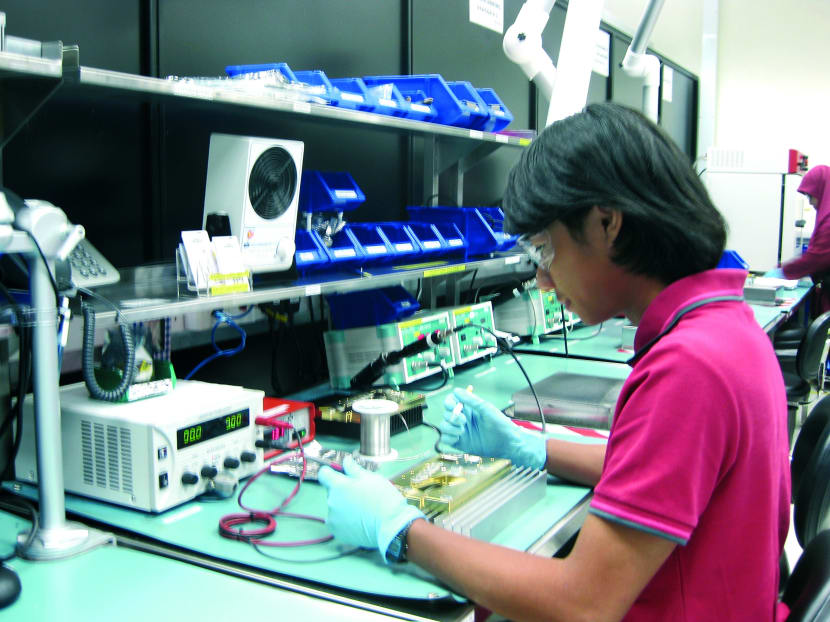Public-private partnerships can cut through precision engineering’s labour woes
SINGAPORE — Nineteen-year-old ITE graduate Muhammad Irshad Noorhalim has seen and done much more than the average intern.

Irshad, a recipient of the National Precision Engineering Study Award,is now helping laser solutions firm Coherent produce cutting-edge components. Photo: Wong Wei Han
SINGAPORE — Nineteen-year-old ITE graduate Muhammad Irshad Noorhalim has seen and done much more than the average intern.
In the six months he has been interning at Nasdaq-listed laser solutions provider Coherent, he has been to the company’s United States headquarters in Santa Clara for a three-week training programme and is now helping the company produce cutting-edge laser components in Singapore.
“I’m now part of the team producing Coherent’s MATRIX, a product used for material processing. We build its cooling system, its board and its laser optics, among others,” he said.
Irshad was among 100 individuals who received the National Precision Engineering Study Award (NPESA) last year and is a talent whom agencies such as the Economic Development Board (EDB) are helping the precision engineering industry develop in partnership with the private sector.
With about 2,700 companies and 94,000 jobs, precision engineering has been flagged as one of the focus industries for capability and talent development, amid a push by the Government to transform Singapore’s manufacturing sector.
The precision engineering industry is the backbone of sectors as diverse as aerospace, oil and gas, medical devices and electronics, with precision engineering firms designing and building complex modules and components, as well as sophisticated machinery and systems.
“Through initiatives such as the Precision Engineering Vocational Continuing Education and Training (PEVC) programme, the EDB is grooming a pool of 2,800 master craftsmen to take on higher-value, more complex manufacturing operations and leadership responsibilities,” said Minister for Trade and Industry, Mr Lim Hng Kiang, last month at the Committee of Supply debate.
Such initiatives are crucial for a growth industry that is desperately in need of talent, said Coherent’s General Manager Goh Hin Tiang.
“Precision engineering covers many segments and, hence, requires a broad range of skill sets. It’s especially challenging for us because laser is a new industry in Singapore — it’s not even part of the tertiary curriculum,” he said. “It’s not easy to find people with the right specialised training and interest, not with the labour woes we’re having now.”
To address these issues, the US firm partnered with the EDB to groom precision engineers and technicians three years ago, which was also when it first set up a facility in Singapore.
Since then, it has taken in more than 10 ITE interns, including Irshad who, as an NPESA awardee, will have to serve a two-year bond in the precision engineering industry after completing his National Service.
Another company that has been equally active in changing the industry’s manpower landscape is local firm JEP Precision Engineering. The aerospace contractor, which manufactures components such as engine casings and landing gears, is a strong proponent of vocational training and was among the first to send employees for Precision Engineering Master Craftsman (PeMC) training.
The programme, jointly launched last November by the Singapore Manufacturing Federation and agencies such as the EDB and SPRING, offers a two-year part-time course for existing precision engineers and technicians, who will be paid a monthly salary of at least S$3,500 upon graduation.
JEP has sent two engineers for PeMC training, both of whom are ITE graduates. Vocational training is a way to attract and retain ITE graduates, an important source of manpower amid the current labour crunch, said Chief Executive Soh Chee Siong.
“ITE graduates, with their strong hands-on knowledge, can be the backbone of the industry’s manufacturing workforce. They make up the majority of the 137 people on our shop floor,” he said.
“Certifications such as PeMC aren’t just about training. They are also about giving them recognition and sending the message that manufacturing … can be a rewarding career path.”
This focus on talent development is crucial for companies such as JEP and Coherent, which will require resources to expand.
“Just last year, our sales hit S$29 million — a 10 per cent growth — and we’re looking at double-digit growth going forward as we expand further into the oil-and-gas industry,” said Mr Soh.
Coherent is similarly optimistic, but Mr Goh said much would depend on how the industry manages its manpower issues. “Besides the EDB, we’re also working with Nanyang Technological University, A*STAR and other agencies to communicate our needs and explore the resources we can tap.
“But it’s not easy — training takes time and we need to build the right curriculum which, in turn, needs a critical mass ... So, it’ll take time.”





